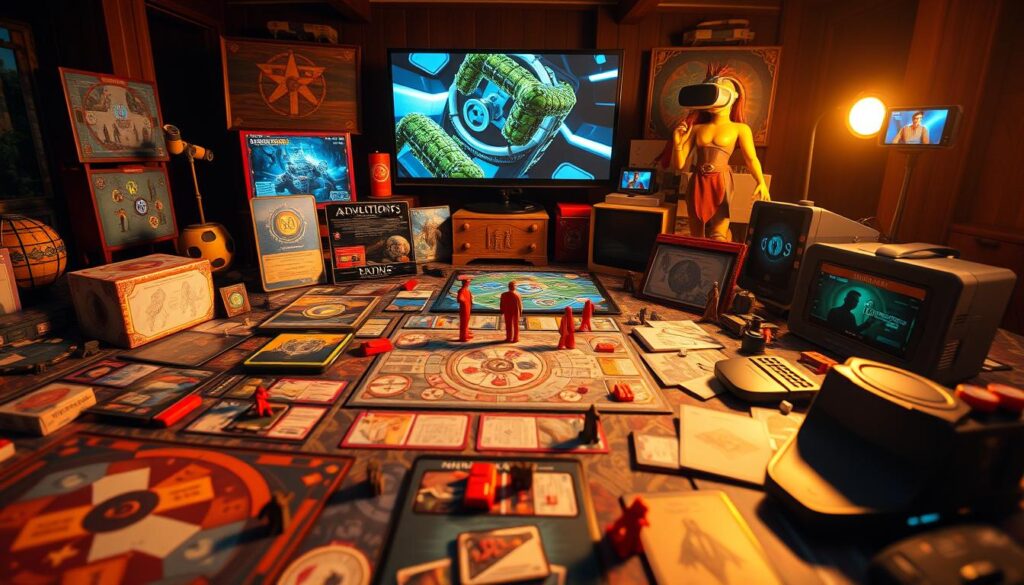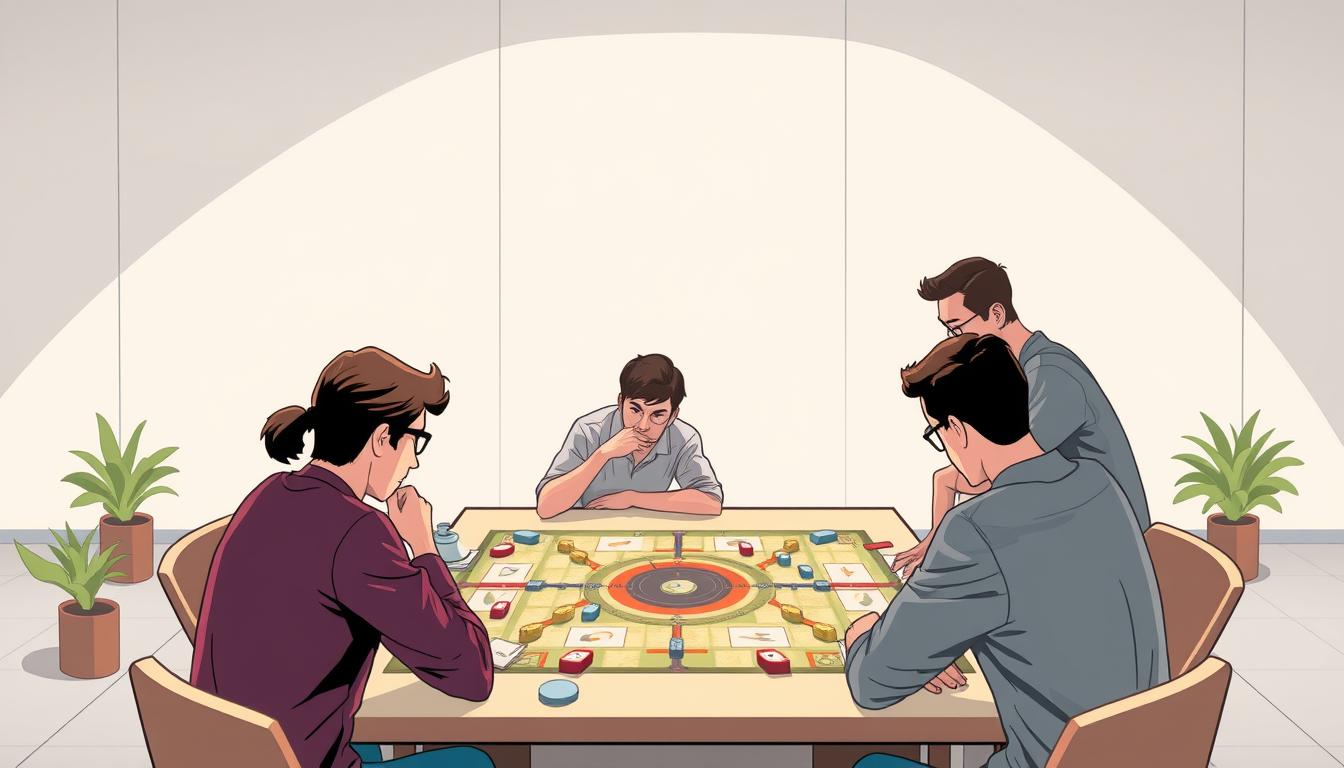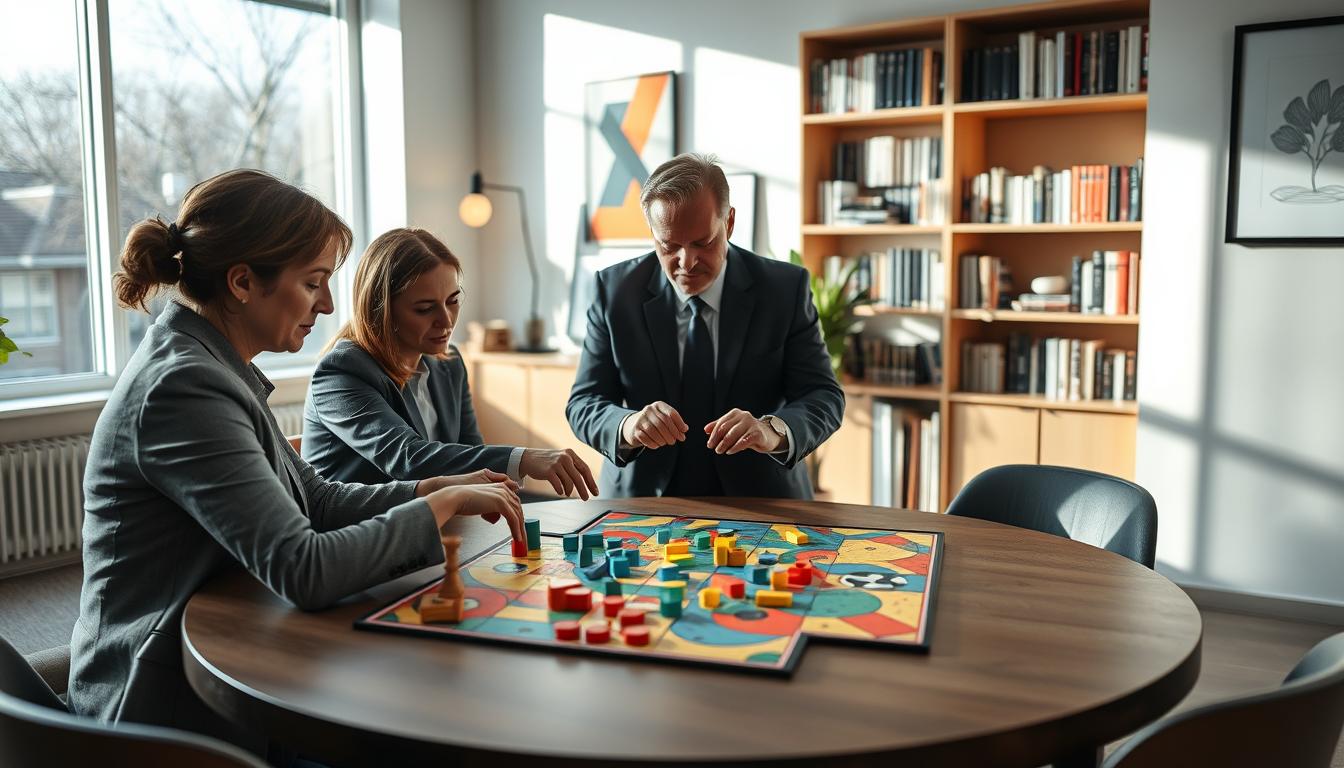Games simulating real-life situations to train reasoning and decision-making
Have you ever thought about how games could improve your decision-making? Games that mimic real-life situations are becoming key in sharpening our skills. They offer a chance to tackle complex problems and make tough choices.
These games are not just fun; they’re also educational. They help us think critically and make better decisions. By playing, we learn to analyze situations and make informed choices.
These games are changing how we learn and make decisions. They offer a unique way to develop our analytical skills. This can benefit us in both our personal and professional lives.
Understanding the Importance of Decision-Making Games
In today’s fast world, decision-making games are key for education and work training. They help improve critical thinking and teach problem-solving and strategic thinking. Players get real-life experience through simulated scenarios.
These games are great for learning to adapt and think fast. Players learn to make choices and predict outcomes. This makes learning fun and helps them remember what they learn.
Using decision-making games in education and training is a smart move. They help learners develop important skills for complex situations. Players get better at making smart choices in a safe, supportive space.

Types of Games that Enhance Reasoning Skills
Many games are made to improve reasoning skills and brain power. They fall into three main groups: strategy games, simulation games, and collaborative games. Each type has its own set of challenges that push players to think deeply and make smart choices.
- Strategy Games: In these games, players must weigh many factors and guess what their opponents will do. They need to plan their moves carefully. Chess and Settlers of Catan are great examples, as they boost critical thinking and planning ahead.
- Simulation Games: These games set up real-life scenarios for players to deal with. Games like SimCity and Flight Simulator let players practice making decisions in real-world situations. This helps improve their reasoning skills through hands-on experience.
- Collaborative Games: These games focus on working together. Players must work as a team to reach their goals. Games like Pandemic help improve teamwork and problem-solving by encouraging everyone to contribute their ideas.
These different types of games offer a wide range of challenges. They help players develop important thinking skills. These skills are useful in many areas of life, both personally and professionally.

Creating Real-Life Simulations in Game Formats
Creating engaging real-life simulation games needs a deep understanding of learning through scenarios. These games put players in complex situations that reflect real-world challenges. They help improve critical thinking and decision-making skills.
Key elements like diverse scenarios, player engagement, and feedback are crucial. They make interactive simulations compelling.
Popular games like SimCity and The Sims show the impact of these elements. Players navigate complex systems and see the effects of their choices. This learning is deep and useful in real life.
Having different scenarios in games makes players adapt their strategies. This adaptability makes the game more fun and teaches the value of making decisions under pressure. When players feel their choices matter, they learn more.
| Key Element | Description | Example |
|---|---|---|
| Diversity of Scenarios | Incorporating various challenges to test decision-making skills. | SimCity’s urban planning scenarios. |
| Player Engagement | Keeping players invested in their choices and outcomes. | The Sims’ life simulation aspects. |
| Feedback Mechanisms | Providing insights on the impact of players’ decisions. | Restoration of resources in civilization-based games. |
These elements together create immersive experiences. They prepare players for real-life decision-making. The insights from these simulations help understand the consequences of choices. This enhances problem-solving skills in real situations.
Brain Games for Cognitive Simulation
Cognitive simulation games are key for improving mental skills needed for good decision-making. These games offer immersive experiences that boost critical thinking and strategic planning. They also help with ethical reasoning.
By facing real-life challenges in games, players sharpen their cognitive abilities. This happens through engaging gameplay that stimulates the mind.
Overview of Cognitive Simulation in Gameplay
Brain games present players with quick thinking and sound judgement challenges. Games like “This War of Mine” and “Quandary” offer dilemmas and resource management tasks. These tasks push players to think deeply and consider different viewpoints.
These games are not just fun. They also teach valuable lessons. They help improve reasoning skills as players learn to make better choices.
Impact of Brain Games on Decision-Making Skills
Brain games enhance decision-making by teaching players to analyze information well. They learn to make choices that are both practical and ethical. This training helps them solve complex problems better.
Regularly playing these games can greatly improve cognitive skills. It makes players more effective in real-life situations.
Popular Games for Enhancing Decision-Making
Playing popular decision-making games can really boost your reasoning and strategic skills. These games mimic real-life scenarios, letting players tackle ethical dilemmas and make big choices. Here are some top games that improve decision-making through fun gameplay.
Quandary: A Game for Ethics and Civics
Quandary puts players in moral dilemmas, teaching civic values. It tests critical thinking by asking players to make ethical choices that shape a fictional world. It’s a standout game for learning ethics.
Hall of Heroes: Social Interaction and Cooperation
Hall of Heroes is all about teamwork and working together. Players tackle challenges as a team, promoting communication and support. It’s great for improving social skills and decision-making.
Sid Meier’s Civilization V: Flexible Historical Learning
Sid Meier’s Civilization V lets players dive into historical simulations. They make choices that shape their civilizations. It’s a game that encourages creativity and strategic thinking.
SimCity: City Planning and Management
SimCity lets players build and manage a city. They balance resources and citizen needs, learning to make smart decisions. It’s a game that teaches effective planning and problem-solving.
Educational Value of Decision-Making Games
Decision-making games are great for learning. They make learning fun and engaging. These games teach important concepts and improve critical thinking.
Engagement and Motivation through Play
Games make learning exciting. They keep learners interested and active. This way, they learn better than just sitting and listening.
Games are fun and safe. They let people try different ways of making decisions. This makes learning a fun activity.
Transferable Skills Gained from Game Experiences
Playing games helps develop useful skills. Skills like teamwork and leadership are learned through challenges. These skills are important in school and work.
By playing games, learners get ready for real life. They improve skills that help in many areas of life.
Future Trends in Simulation Games for Learning
The world of simulation games is set to change a lot with new tech. Soon, games will use virtual reality and artificial intelligence. This will make learning feel more real and exciting.
Teachers and game makers are seeing how games help students think and make decisions. They want to make games even better to meet different learning needs. This means games will be more fun and effective for everyone.
Games are becoming more interactive, which is really cool. This change could help students learn and remember more. It will let them solve complex problems in a safe, virtual space.
Incorporating Games in Educational Curriculums
Adding games to education can make learning fun and interactive. It boosts student involvement and sharpens their thinking and decision-making skills. Many studies show how games can improve learning outcomes for both students and teachers.
Case Studies of Successful Integration
Many schools have seen great results from using games in their lessons. For instance, an elementary school in California used simulation games to foster teamwork and problem-solving. Students showed more interest in learning and better retention of hard topics.
Another example is a high school that used a strategy game to teach history. This led to more students being engaged and interested in history lessons.
Challenges and Solutions in Classroom Settings
However, adding games to the classroom can be tricky. Issues like lack of resources and varying student interest can arise. To overcome these, training teachers is key.
Workshops on using games effectively can help teachers integrate them smoothly. By linking games to specific learning goals, teachers can create a better learning environment.
Role of Discussion in Enhancing Game-Based Learning
In game-based learning, success goes beyond just playing games. Discussion plays a key role in learning. It lets players think about their actions and decisions after playing. This helps them share strategies and understand each other’s thought processes.
Discussion creates a space where everyone learns together. Players can see things from different angles. This helps them make better choices and understand the game better.
Discussion does more than just help players think. It builds a community of learners who support each other. By sharing their experiences, players grow together.
Good discussion leaders make sure everyone gets a chance to speak. This makes learning more inclusive. It also encourages players to try new things and learn from each other. Discussion makes learning more than just individual effort. It makes it a shared experience.
Utilizing Games for Team Building and Collaboration
Team building games are a great way to improve how teams work together. They make teams stronger by encouraging everyone to work as one. These games help people feel at ease, sharing their thoughts and ideas freely.
Players start to trust each other more. They learn to appreciate each other’s strengths. This makes them better at working together.
Games teach teams to make decisions together. This is key for teamwork. Teams learn to face challenges together, becoming more united.
Companies that use team building games see big improvements. Teams work better together, solving problems more efficiently. This leads to a happier and more productive workplace.
Assessing the Effectiveness of Decision-Making Games
It’s important to check how well games help with decision-making. Teachers can see if these games work by looking at how much people enjoy them. They can look at how long players spend on the game, how they interact, and if they have fun.
There are many ways to figure out if these games are good for learning. You can use both talking to players and looking at numbers. Talking to players can give you a deep understanding of their thoughts. Looking at numbers can show if the players got better at making decisions.
It’s also key to see if these games help in real life. Do they help people make better choices at work or at home? Making clear rules to check these things helps make the games even better.
Conclusion
Decision-making games are powerful tools that improve our thinking and strategy skills. They help us deal with complex situations in our daily lives and work. By playing these games, we learn to make smart choices quickly, which is very important.
More and more schools and companies are using these games to teach. This shows how much of an impact they have on learning to make good decisions. It helps us think critically and get ready for life’s challenges.
Using decision-making games in learning makes things more fun and engaging. It helps us solve problems actively and shows how crucial these skills are for success. This way, we keep improving our decision-making abilities through fun and interactive games.
FAQ
What are the main benefits of using games that replicate real-life situations?
Games that mimic real-life scenarios help improve reasoning and decision-making. They let players tackle complex situations, boosting their analytical skills. This makes them better at making judgments, which is key in school and work.
How do decision-making games improve skills relevant to education and the workplace?
Decision-making games help develop important skills like problem-solving and strategic thinking. They make players adaptable and quick, essential for fast-paced environments in school and work.
What types of games are effective for enhancing reasoning skills?
Many game types boost reasoning skills, like strategy, simulation, and collaborative games. Each type offers unique challenges. They help players analyze, strategize, and make decisions, sharpening their minds.
What key elements are important for creating engaging real-life simulations in games?
Key elements for engaging gameplay include diverse scenarios, player involvement, and feedback. Successful simulations teach players about complex decision-making and the effects of their choices.
Can you give examples of brain games that enhance cognitive skills?
Yes, games like “This War of Mine” and “Quandary” challenge players with tough decisions. They improve mental agility and decision-making abilities.
What popular games are known for improving decision-making skills?
Games like “Quandary” teach ethics and civic values. “Hall of Heroes” focuses on teamwork. “Sid Meier’s Civilization V” encourages creative strategy. “SimCity” combines city planning with economic management.
How do decision-making games contribute to educational outcomes?
These games keep students engaged, boosting motivation and learning. They teach skills like teamwork, leadership, and analysis. These skills are useful in real life and help students learn and remember better.
What future trends are expected in simulation games for education?
Future trends include virtual reality and artificial intelligence. These will make learning more immersive and realistic. This shift will change how we learn in educational settings.
How can decision-making games be effectively incorporated into curriculums?
To integrate games well, use case studies to show benefits and learning outcomes. Overcome challenges like resource limits and student interest with teacher training and aligning games with learning goals.
Why is discussion important in game-based learning?
Post-game discussions help players reflect on their strategies and decisions. They foster critical thinking and let students learn from each other. This dialogue enriches the learning experience.
How do games facilitate team-building and collaboration in organizations?
Games with cooperative mechanics promote teamwork and collective decision-making. They improve interpersonal skills and communication, enhancing team dynamics and productivity.
What methods can be used to assess the effectiveness of decision-making games?
Assessing games involves looking at engagement, skill development, and relevance to real life. Use both qualitative and quantitative methods to improve game design and ensure they meet learning goals.














